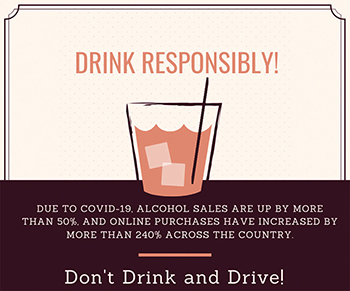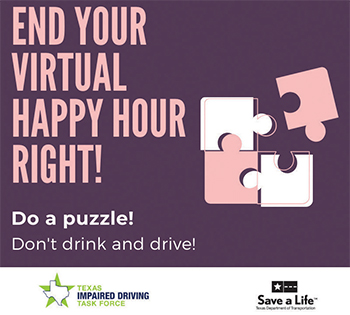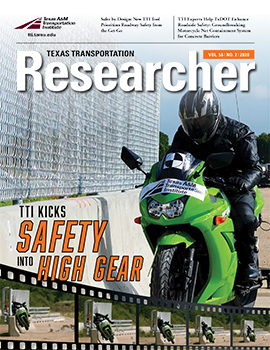SOCIAL DISTANCING GUIDELINES during the COVID-19 pandemic prompted people to get creative with the ways they socialize with friends and family. With alcohol sales on the rise and more people staying at home, virtual happy hours were born. One option for holding a virtual happy hour: having a meetup from the comfort of your home using videoconferencing software.

But virtual happy hours have one thing in common with traditional ones — participants can become too inebriated to drive. To remind people not to drive impaired, the Texas Impaired Driving Task Force (TxIDTF) started a social media campaign, End Your Virtual Happy Hour Right. The campaign suggested fun things to do at home after a virtual happy hour to deter impaired driving through clear “don’t drink and drive” messaging.
Housed at the Texas A&M Transportation Institute (TTI), TxIDTF has the mission to eliminate crashes and injuries caused by impaired driving in Texas. A traffic safety grant funded through the Texas Department of Transportation (TxDOT) makes the task force possible. TxIDTF’s 45 members represent nearly every facet of the impaired-driving spectrum, with stakeholders from education, enforcement, prosecution, transportation research, the highway safety office and the judiciary. Topics like toxicology, breath testing and ignition interlocks are regularly addressed by the task force. TTI Research Scientist Troy Walden, director of TTI’s Center for Alcohol and Drug Education Studies, and Allison Rounsavall, alcohol program manager at TxDOT, serve as TxIDTF co-chairs. TxIDTF also maintains the Texas Impaired Driving Plan, a strategic plan for reducing impaired driving statewide.

“With a spike in alcohol sales during the pandemic, we understood the need to continue to use TxIDTF social media platforms to provide clear messaging against impaired driving,” says Walden. “The campaign encouraged people to stay at home and do a puzzle, organize their closet, or read a book instead of running an errand impaired.”
The social media campaign succeeded in reaching more than 3,000 individuals and received significant engagement from TxIDTF followers.
“Social media is one of the best places to reach people when they are at home under shelter-in-place orders,” says Rounsavall. “This campaign allowed TxIDTF to continue to remind people that driving impaired is not something they should do.”
